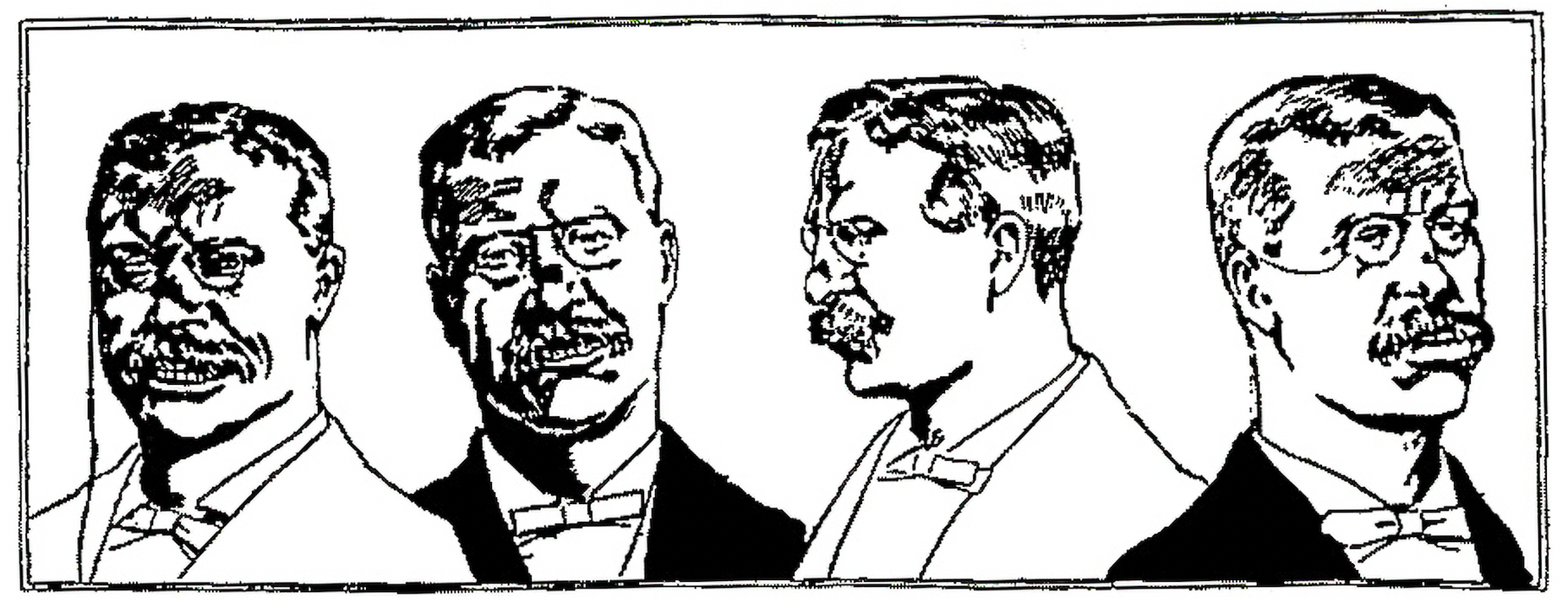Editor’s Note: for a more complete report, see BULLY! — ‘Roosevelt Fires First Campaign Gun’, pages 427 – 441, composed from reports in the New York Times, The Sun, The World, Commercial Advertiser and New York Press.
It was noted, at the time, that the speech sounded more like a presidential campaign speech,
as much of the speech dealt with national issues.
The following account, with selections from those pages, emphasizes the ‘Bully Pulpit’ spirit of
Roosevelt: the man, the soldier and the statesman.
~~~~~~~~~~~~~~~~~~~~~~~~~~~~~~~~~
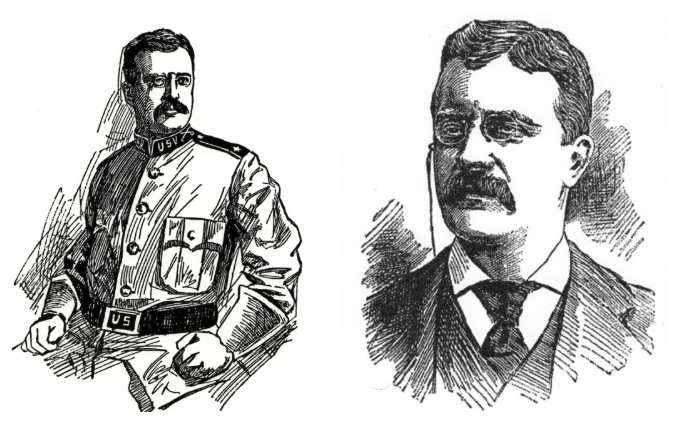
~~~~~~~~~~~~~~~~~~~~~~~~~~~~~~~~~~~~~~~
ROOSEVELT FIRES FIRST CAMPAIGN GUN
———- Carnegie Hall, October 5, 1898 ———-
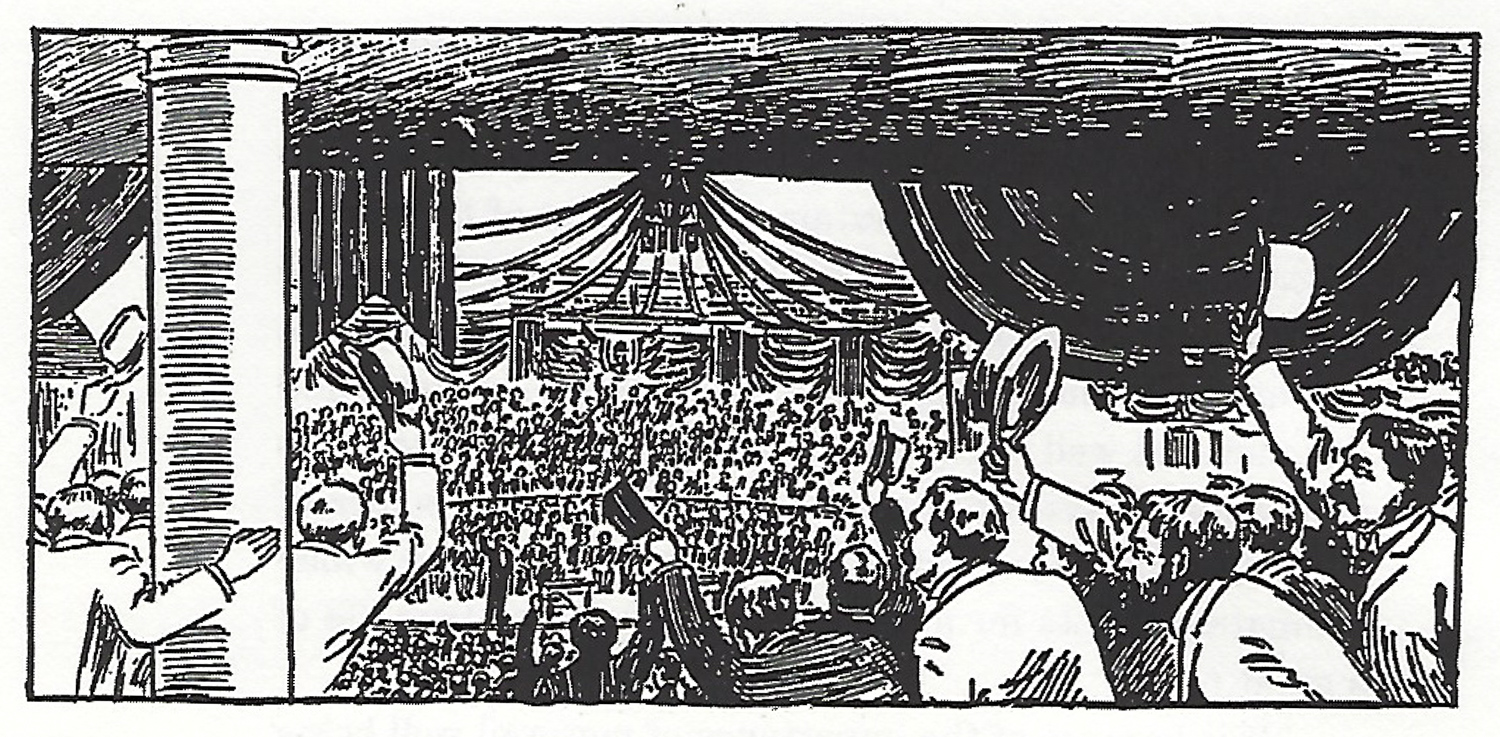 ——————
——————
…. It was a remarkable audience inside Carnegie Hall. Magnificently dressed women occupied the boxes in the galleries and men in evening dress sat or stood beside them. It looked like a grand opera night ….
It was a brilliant scene, formed by thousands of faces, framed in the profuse drapery of flags….The galleries and stage were draped with the National colors in flags and bunting, and great rosettes …were studded with shields bearing the Nation’s coat-of-arms….There was a huge portrait of Col. Roosevelt on the wall, surrounded by flags, the picture itself painted in red, white and blue….
A quartet from the Twenty-first Assembly District entertained the crowd with several campaign songs written for the occasion. The first went like this:
There’s a good time acomin’ and it aint’ far away!
Hail! Roosevelt, Hail!
And we’ll all get together on election day,
Hail! Roosevelt, Hail!
We’ll cast our votes for an honest man,
Hail! Roosevelt, Hail! ….
…. A few moments before 8 o’clock the people in the hall heard tremendous cheering and shouting outside. It announced the arrival of Col. Roosevelt….
Col. Roosevelt’s entry …. heralded by cheering outside the hall … was at once caught up within and swelled to terrific proportions when the people caught sight of the candidate.
Mr. Roosevelt’s pictures give the public a correct likeness of him, and yet it would be almost impossible to identify him from them. His face has not the well-groomed and somewhat dandyish affect which some of his half-tone portraits show, and he has a peculiar sort of smile, rather boyish, as he blinks his short-sighted eyes through his glasses. He has a ruddy, healthy complexion which the photographs miss, of course, but which is an essential part of the tout ensemble. He looks somewhat older than his retouched photographs make him out to be, and yet the general impression which he makes, at first sight at least, is that of a big, hearty, energetic young fellow, too busy to have room for humbug either in his heart or in his mind.
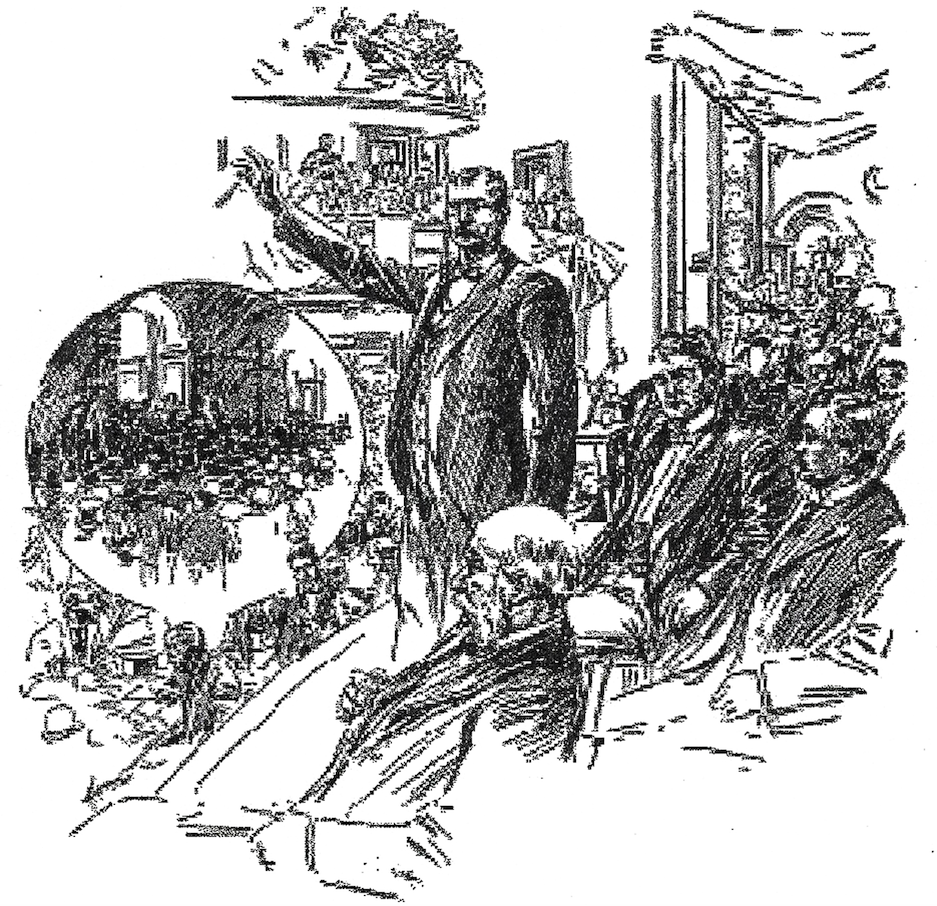
He came walking in at a brisk gait, as if he was in a hurry to communicate to the audience some very important business, but the tremendous greeting slightly rattled him and he grew somewhat pale. He soon rallied, however, and, catching sight of some friends in the boxes, fell to waving, smiling that distant, blinking smile of his….
“Ladies and Gentleman,” said General Woodford…
“I now have the great pleasure of introducing Col. Theodore Roosevelt, the Republican nominee for the great office of Governor of New York,” and then the fun started all over again …. The Colonel looked serious when he first stepped forward, but at the end of about a half a minute’s shouting he couldn’t help smiling, and the smile grew broader. He gave one disapproving glance up at the box where Mrs. Roosevelt and little Miss Roosevelt sat.
Little Miss Roosevelt couldn’t help being just as enthusiastic as everybody else. The Colonel waved at her. The whole audience was on its feet again….
When at last there was a sign of the enthusiasm dying away, there was a mighty shout of “Who’s all right?” and a mighty roar in response, “Teddy!”
“Who is Teddy?” someone shouted, and like a roll of thunder came back the response, “First in war, first in peace, first in the hearts of his countrymen.” Thumpty–thump–thump–thump–thumpty–thump–thump–thump, stomped with a vigor that fairly shook the building.
Mr. Roosevelt took up his speech…“Mr. Chairman,” he called out in the peculiar un-oratorical rough and ready way that marked his speaking…As a speaker he is as much a Rough Rider as he showed himself to be at Santiago….Aggressive sincerity marked his every word and every gesture. When he grew particularly emphatic, when he seemed to be defying the whole world to dispute the logic of his words, he would shake one or two fingers at the gallery, showing his teeth all the while and presenting a picture of the fighter as well as the man of unshakable convictions….
“….[M]aterial prosperity is indispensable yet it cannot, by itself, atone for the lack of that higher and finer moral and spiritual excellence which ultimately counts for more than all else in the true life of a great nation….
“Honesty we must have; no brilliancy, no ‘smartness,’ can take its place. Indeed, in our home affairs, both in the State and the municipality, it has always seemed to me that what we need is not so much genius, as the homely, everyday virtues of common sense and common honesty.
“Of course, there are many problems for the solution of which we need the best intellect of the commonwealth. But, for the ordinary public officer, what is necessary is to be watchful, energetic, broadminded and disinterested. Every one will make mistakes, and when made the best remedy is cheerfully to recognize their existence and promptly proceed to undo them. If we proceed in this way, if we promptly punish men who misbehave and sternly refuse to let any consideration either of political or personal friendship be treated as an offset to wrong-doing, it is not very difficult to secure that honest administration which is indispensable if our republic is to endure. No influence of any kind must avail to shield the wrongdoer, be he of high or low degree.
“In dealing with our citizens, it is always best, where possible, not to treat any one group as a class apart. On most points the interests of the working-man, of the man who toils with his hands, are simply those of all good American citizens. Yet, he has special interests; interests that are peculiarly his. Wherever he can be helped, he most certainly should be helped. Ordinarily, I firmly believe and shall ever insist that the help that will most surely avail the man who works is self-help. But the history of many of the trades’ unions has shown that very much can also be done by that form of self-help where many join together to help one another.
“It is not well to teach any one to rely mainly upon the state, for the state can never play any but a subordinate part in a man’s welfare. Yet, the fact remains that along certain lines a great deal can be gained by legislation. Legislation cannot make a man prosperous, for it cannot make him honest or thrifty or industrious; but it can sometimes secure the fruits of honesty, thrift and industry to the rightful owners ….
“Yet, after all, it seems to me that the great lesson to be taught our people is the lesson both of brotherhood and of self-help. In our several ways each of us must work hard to do his duty, each must preserve his sturdy independence; and yet each must realize his duty to others. And to each who performs his duty in whatever way, must be given the full measure of respect….
“The man of leisure and the man to whom life had always been one of toil sprang together at the call of their country and stood side by side to share the same labor and to face the same death. They did whatever they were called to do. They served in the ranks and they bore commissions as fate and their own efforts willed it, but wherever they served they were American soldiers, no more and no less.
Living, each one strove incessantly to do even more than his duty, scorning to do less, and ashamed to falter or ask for aid, yet always glad to help a brother who, however willing, was weaker. Dying, each faced with equal courage the fate which, in an instant of time, blots out all the differences that we raise with such infinite labor on this earth. Living and dying, they gave us a lesson in American citizenship, and this lesson which they taught in war, let us profit by as we live in peace.”
During the time the candidate was speaking, the Rough Riders on stage were in a broad grin of delight …. the speech was ended amid the heartiest and most vociferous applause ever given a speaker on a New York platform….

— New York Times, The Sun, The World, Commercial Advertiser, New York Press / pages 427 — 441
— Illustrations: first & last, W.H. Shindler, illustrator / New York Press | second, New York Herald | third, The World / Carter, Illustrator
~~~~~~~~~~~~~~~~~~~~~~~~~~~~~~~~
Of One Mind And One Purpose
If anybody had said a year ago that a crowd made up as this one was would have gathered this year of one mind and one purpose to shout itself hoarse for the Republican candidate for Governor of the State, that man would have been put down as crazy.
— The Sun / page 442
=================================================
Col. Roosevelt then began a vigorous campaign throughout the state until election day, November 9th
— coverage not included in BULLY!
Roosevelt’s Democratic opponent Augustus Van Wyck was a lawyer, judge and politician from Brooklyn.
=================================================
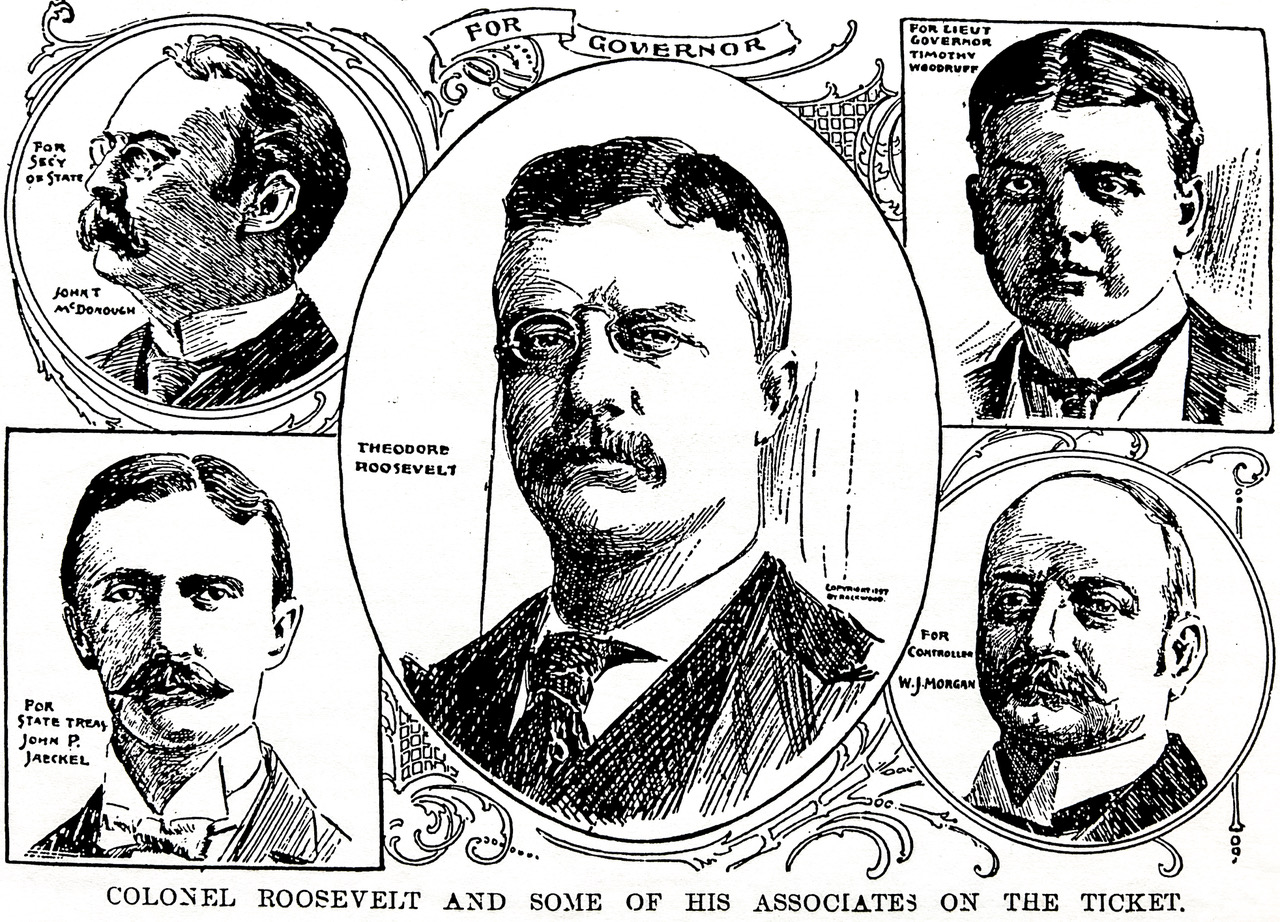
— New York Herald / September 28, 1898
=================================================
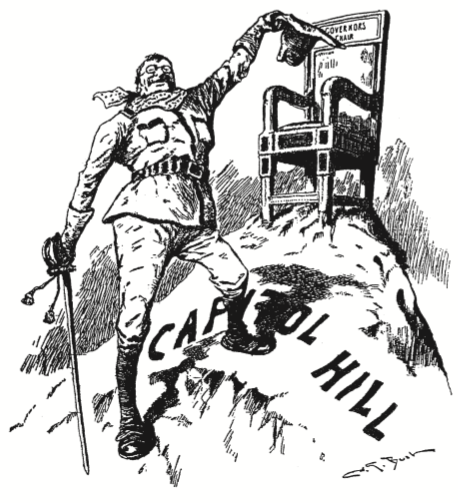
THE ROUGH RIDER’S LATEST CHARGE
— The World / page 450
— Bush, Illustrator
——————————————-
—– Wednesday, November 9, 1898 —–
![]()
Theodore Roosevelt, the Republican candidate, was elected Governor of New York State yesterday by a plurality over Augustus Van Wyck, the Democratic nominee, which will not be less than 25,000 and may be considerably more*….The entire Republic State Ticket shares this success, and the Legislature of 1899 will be safely Republican in both branches….
— New York Tribune / page 451
* Roosevelt received 661,707 votes
* Augustus Van Wyck received 643,921 votes
——————————————-
—– November 9, 1898 —–
Col. Roosevelt Informed
Oyster Bay, Nov. 8 — Col. Theodore Roosevelt was notified tonight of his victory by a telegram from Chairman Odell of the Republican State Committee, saying he had been elected Governor by from 30,000 to 40,000 plurality….The news went all over the house, and it was some time before the sounds of rejoicing subsided….At the request of some of the reporters, he made this statement:
“I appreciate the honor very deeply, and I appreciate even more deeply the responsibility involved in the honor. I shall do all in my power to redeem every promise I made, expressed or implied….I shall try to administer the office of Governor in the interests of the whole people….”
This from Senator Lodge of Massachusetts is the first message of any sort that came directly to Colonel Roosevelt:
“Hon. Theodore Roosevelt, Oyster Bay, L.I.:
“Your election is a great victory for good government and for patriotic, wise American policies, both at home and abroad. Every good wish and hope, every congratulation goes to you from me and mine.”
HENRY CABOT LODGE
— New York Times, The Sun / pages 452 – 453
——————————————-
Governor Roosevelt
Editorial —Roosevelt won, as his Rough Riders won at San Juan, not without hard work and fierce fighting all the way up the hill. But, he got there all the same.
The full significance of the event that has occurred in the politics of New York State will appear slowly to the public comprehension. This is not an ordinary victory of partisanship over partisanship. The new Governor has been elected on his merits as a man …. absolute independence, absolute fearlessness, and honesty as bright as the sunshine….
The Honest Money Democrats, the American Flag Democrats, the Good Government Democrats who joined with their Republican brethren in supporting the Republican who is his own master against the candidate of splendidly organized and thoroughly disciplined Crokerism, now reaching out from the city for the control of State and nation, have accomplished by this method a result which centuries of effort on the old Mugwump plan would never produced. They have helped strike down the most industrious, relentless, and monopolistic of Bosses….The narrowness of the margin of victory renders their service the more conspicuous and illustrious.
— New York Tribune / page 454
——————————————-
Platt’s Gratitude
“I feel that Col. Roosevelt deserves all honor and credit for the victory in the State, for I am certain that he is the only man who could have carried our standard to victory this year. Besides his strong personality, he possesses remarkable physical resources, which were no small factor in the campaign just ended.
“Indeed, I know of no other man who would have been able to conduct the canvas he has made without breaking down before the schedule was completed….
“He has my heartiest congratulation and best wishes.”
— Senator Thomas C. Platt /Commercial Advertiser / page 453.
——————————————-
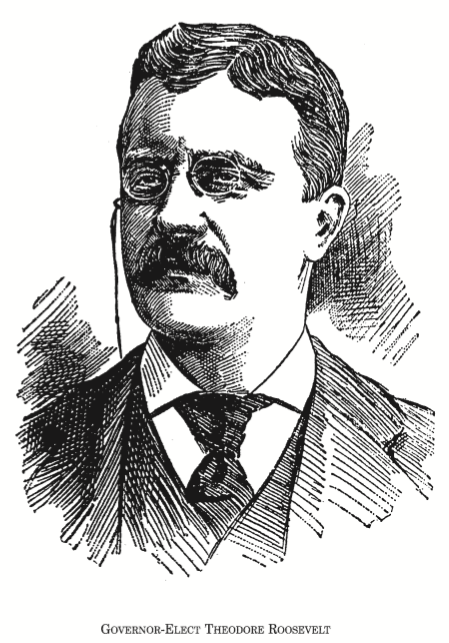
—————————-
=================================================
Visit Theodore Roosevelt & NYS Politics, 1898 / Portfolios
——————
Theodore Roosevelt & N.Y.S. Politics / 1898 — Excerpts from BULLY! / Sept 1st – 22nd …. link
——————
Visit Roosevelt Rough Rider / Portfolios
Roosevelt’s Rough Riders: June – August, 1898 / from BULLY! …. link
Roosevelt’s Rough Riders: September – November, 1898 / from BULLY! …. link
——————
Also, Visit
—————— AND ——————
Camp Wikoff, National Military Park Proposal …. link
———————-
BULLY! books available @ Amazon & Barnes & Noble
———————————–

EXCLUSIVE PORTFOLIOS
Art & Architecture Quarterly / East End
________________________________________________

